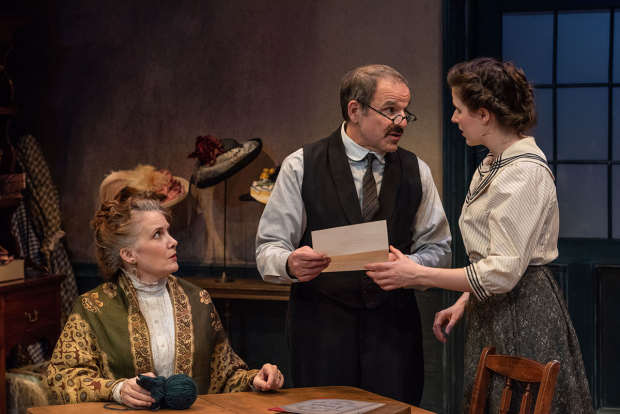The Price of Thomas Scott Puts the Price of a Soul in a Pair of Dancing Shoes
The 20th-century morality play kicks off the Mint Theater’s series of works by Elizabeth Baker.

(© Todd Cerveris)
The Meet Miss Baker series is the Mint Theater's initiative to introduce its audiences to the work of 19th- and 20th-century British playwright Elizabeth Baker — and the company is starting with Baker's innocuous The Price of Thomas Scott.
First produced in 1913, The Price of Thomas Scott is a problem play that wrestles with the growing pains of post-Victorian morality — and it does so in a very Victorian manner. Set in a lovely furnished parlor (designed by Vicki R. Davis) that remains quaint despite its dinginess, the characters are excessively polite, even as they attempt to completely subvert one another's values systems. Representing the old guard is Thomas Scott (Donald Corren), a jolly, hymn-humming Protestant who has slumped into poverty thanks to his failing shop, held afloat solely by his daughter Annie (Emma Geer) and her knack for millinery (costume designer Hunter Kaczorowski gets to fill the stage with audacious hats that complement his conservative English frocks). Annie would much rather be living and working among the fashion-forward in Paris, while her brother Leonard (Nick LaMedica) dreams of going away to a prestigious school, but neither funds nor their father's ideas of propriety will allow for either of those things.
Possible salvation arrives in the form of a well-to-do man named Wicksteed (Mitch Greenberg), who offers Scott 500 pounds for his store with the intention of turning it into a Courtney dance hall. Familial responsibility compels Scott to take the money. Puritanical antipathy to dancing requires him to refuse. An angel and a devil are sitting on Scott's shoulders. It's just unclear which voice is the one leading him into temptation — and hypocrisy.

(© Todd Cerveris)
The audience's temptation is to project the moral standards of our post-Footloose world onto Scott and what we would now consider his blatantly misguided beliefs. But I'm willing to accept that we're supposed to sit a little longer with the question that Baker poses in her dialogue: "What is the difference between a good strong prejudice and a conviction?" Is staying true to a conviction a noble act in itself? Possibly, and director Jonathan Bank does a fine job allowing that question to press on our brains via today's religious-freedom debates, which continue to pit personal beliefs against broader human rights (Manhattan Theatre Club's upcoming The Cake will circle those questions in the context of LGBTQ rights). Unfortunately, not much of that intellectual or emotional tension remains inside The Price of Thomas Scott itself, where the question, To dance, or not to dance? renders little sense of urgency.
Corren does manage to portray Scott as a sincere man of conscience — not just the "prejudiced fool" that Wicksteed accuses him of being. But Geer's performance earns most of our sympathies in the end. She plays Annie as a quietly strong, self-possessed woman who shudders at the thought of besmirching her father's reputation and follows that impulse all the way to her own disenfranchisement. She succumbs to one dance with the strapping Hartley Peters (a charming performance by Josh Goulding), but I suppose it wasn't quite magical enough to compel her to dishonor her father by attending a dance at the Town Hall. Perhaps it's a symptom of fatigue at the tolerance of intolerance, but by the end of this moral back-and-forth, I couldn't help but wish that Hartley had just gone full Kevin Bacon and settled it all on the dance floor.







